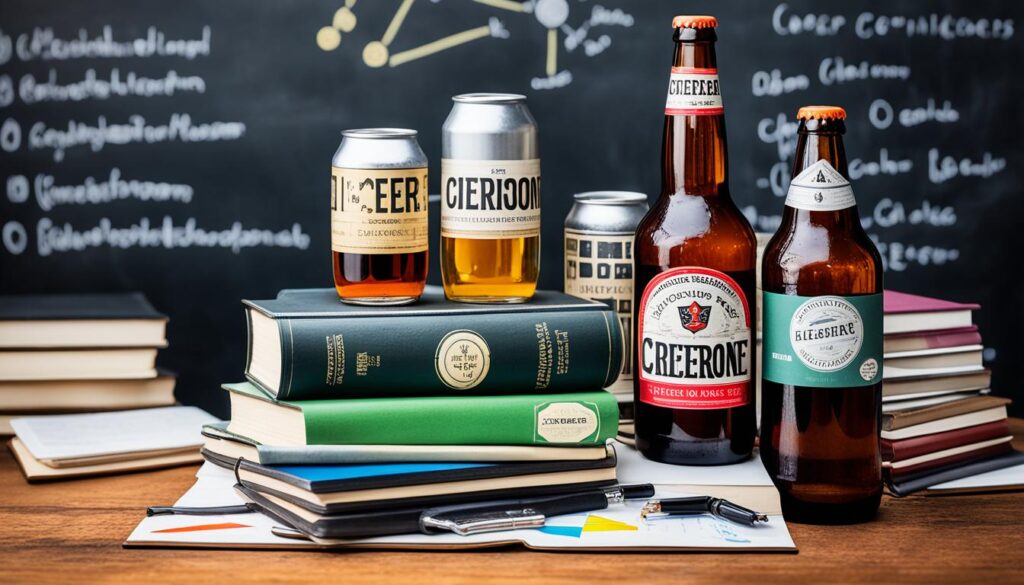The journey to becoming a Certified Cicerone is an exciting and challenging one. It involves a rigorous certification process that tests your knowledge and skills in all aspects of beer, from brewing to draft dispense. By following the steps outlined in this guide, you can embark on your own journey to becoming a certified cicerone and join the ranks of beer experts.
In this guide, we will walk you through the cicerone certification process, share tips from experienced beer professionals, and provide insights into the future of the Cicerone Program. Whether you are a passionate homebrewer or a beer industry professional looking to enhance your knowledge, this guide will provide you with the information and resources you need to achieve your goal of becoming a certified cicerone.
Cicerone Certification Requirements
Becoming a Certified Cicerone requires meeting specific requirements outlined by the Cicerone Certification Program. These requirements encompass passing the Certified Beer Server exam, completing the Certified Cicerone exam, and demonstrating proficiency in various areas of beer knowledge, including beer styles, brewing processes, and flavor evaluation.
To succeed in the exams and achieve certification, there are some important factors to consider:
- Studying Diligently: The exams cover a wide range of topics, so allocating sufficient time for studying is crucial. Invest in comprehensive study materials, such as books and online resources recommended by the Cicerone Certification Program. These resources provide valuable insights into beer styles, brewing techniques, and the industry as a whole.
- Practicing Tasting and Identifying Off-Flavors: Developing your palate is essential for becoming a Cicerone. Regularly tasting a variety of beers and honing your ability to identify off-flavors will prove invaluable during the exams.
- Understanding the Beer Industry: Demonstrating a strong understanding of the beer industry is essential. Stay updated on current trends, breweries, and the cultural significance of beer. This knowledge will not only enhance your exam performance but also deepen your overall appreciation for beer.
By fulfilling these requirements and diligently preparing for the exams, you’ll be on your way to becoming a Certified Cicerone. Remember, the journey requires dedication, passion, and a commitment to expanding your knowledge of the world of beer.

Study Materials and Resources
Preparing for the Cicerone exams requires access to comprehensive study materials and resources. To assist you in your journey towards becoming a certified cicerone, we have identified some essential materials that can aid in your studies.
Books
One valuable resource is “The Oxford Companion to Beer,” a comprehensive guide that covers a wide range of beer styles and brewing processes. This authoritative book provides in-depth information and serves as an excellent reference for aspiring cicerones. Additionally, “Tasting Beer” by Randy Mosher is another recommended read that explores the world of beer tasting, flavor profiles, and brewing techniques.
Online Courses and Training Programs
For a more structured approach to learning, online courses and training programs offer a convenient and comprehensive way to study. The Cicerone Certification Program itself provides an online training program, which covers all the necessary knowledge and skills required for the exams. These programs offer flexibility in terms of study pace and allow you to engage with relevant content whenever and wherever it suits you.
Practice Tests
Practice tests are invaluable tools when it comes to exam preparation. They allow you to assess your knowledge, identify areas for improvement, and familiarize yourself with the types of questions that may be asked. The Cicerone Certification Program offers practice exams that simulate the real testing environment, giving you a chance to gauge your readiness and build confidence.
Remember, studying for the Cicerone exams requires dedication and consistent effort. Utilizing these study materials and resources can greatly enhance your chances of success.
| Study Material/Resources | Description |
|---|---|
| “The Oxford Companion to Beer” | An authoritative guide with in-depth information on beer styles and brewing processes. |
| “Tasting Beer” by Randy Mosher | A comprehensive book that explores beer tasting, flavor profiles, and brewing techniques. |
| Online Courses and Training Programs | Structured online programs that cover all aspects of the Cicerone exams, offering flexibility and convenience. |
| Practice Tests | Simulated exams to assess knowledge, identify areas for improvement, and familiarize oneself with question formats. |
By utilizing these study materials and resources, you can bolster your knowledge and confidence in preparation for the rigorous Cicerone exams.

Tips for Success in the Exams
If you’re preparing to take the Cicerone exams, it’s important to be well-prepared in order to succeed. Here are some valuable tips to help you excel in your certification journey:
- Enrich Your Understanding through Reading and Activities: To expand your knowledge and deepen your passion for beer, immerse yourself in reading materials that cover a wide range of topics, from beer styles to brewing processes. Visiting breweries and experiencing different beer styles firsthand can also provide valuable insights.
- Join a Study Group: Finding like-minded individuals who are also preparing for the Cicerone exams can be highly beneficial. Joining a study group allows you to exchange ideas, share study materials, and practice tasting and identifying off-flavors together.
- Practice Tasting and Identifying Off-Flavors: Developing your palate is essential for the Cicerone exams. Regularly practice tasting beer and identifying off-flavors to train your taste buds and enhance your ability to evaluate beer accurately.
- Build a Strong Foundation in Beer Styles and Flavor Evaluation: Familiarize yourself with different beer styles, understanding their characteristics and properties. Additionally, honing your skills in flavor evaluation will be crucial for accurately describing beer and food pairings during the exams.
- Manage Your Time Effectively: Time management is key during the Cicerone exams. Make sure you’re familiar with the exam structure and allocate your time wisely. Stay focused and pace yourself to ensure you have sufficient time to answer all questions thoroughly.
“Success in the Cicerone exams requires both knowledge and practical experience. By following these tips and putting in the necessary effort, you’ll be well-equipped to pass the exams and earn your Certified Cicerone designation.”
| Tips for Success in the Exams |
|---|
| Enrich Your Understanding through Reading and Activities |
| Join a Study Group |
| Practice Tasting and Identifying Off-Flavors |
| Build a Strong Foundation in Beer Styles and Flavor Evaluation |
| Manage Your Time Effectively |
Insights from a Certified Master Cicerone
Shane McNamara, a certified Master Cicerone, shared his insights and experiences on the journey to becoming a certified cicerone. He emphasized the importance of beer and brewing education, and the desire to constantly learn and develop new skills. McNamara described the exam as difficult, mentally draining, and exhaustive, with a pass mark set at 85%. He also offered study tips, such as traveling to beer-rich countries to experience different beer styles firsthand and joining study groups to practice tasting and identifying off-flavors.
“Becoming a certified cicerone is a challenging yet rewarding journey. It requires dedication, passion, and a thirst for knowledge. The certification process tests not only your theoretical knowledge of beer, but also your practical skills in tasting and evaluating beer. It’s important to immerse yourself in the beer culture and constantly expand your palate by trying different styles from around the world.”
McNamara also stressed the significance of practical experience in the beer industry, saying, “Working in breweries, bars, or beer-focused establishments is a valuable way to gain hands-on experience and deepen your understanding of beer production, serving, and flavor profiles. This real-world experience complements the theoretical knowledge required for the exams.”
When asked about the impact the certification had on his career, McNamara said, “Becoming a certified cicerone opened doors for me in the beer industry. It helped me stand out among other candidates and gave me the confidence to take on new and exciting opportunities. It’s a testament to your dedication and expertise, which is highly valued in the beer community.”
To illustrate the challenging nature of the exams, McNamara shared an anecdote: “During the tasting portion of the exam, you are presented with blind samples of beer and must accurately describe their flavors, styles, and potential flaws. It requires not only a well-trained palate, but also the ability to articulate your observations in a concise and descriptive manner within a limited timeframe. It’s a mentally demanding and intense experience.”
Aspiring cicerones can benefit from McNamara’s advice: “Take advantage of beer-rich travel destinations. Visit breweries, attend beer festivals, and engage with brewers and industry professionals. Experiencing the diverse beer cultures firsthand will broaden your knowledge and understanding of different styles, traditions, and brewing techniques.”
To complement self-study, McNamara recommended joining study groups or forming tasting clubs: “Collaborating with fellow enthusiasts allows you to share knowledge, practice blind tastings, and discuss the intricacies of beer styles. It’s a supportive and enriching environment that can provide valuable feedback and further enhance your tasting skills.”
In conclusion, becoming a certified cicerone is a challenging yet rewarding process that requires passion, dedication, and a thirst for knowledge. By following the certification requirements, utilizing study materials and resources, and seeking insights from experts like Shane McNamara, aspiring cicerones can embark on their own journey to become beer experts and influential members of the beer community.
Shane McNamara’s Study Tips:
- Immerse yourself in the beer culture and try different beer styles from around the world
- Gain practical experience in the beer industry by working in breweries, bars, or beer-focused establishments
- Travel to beer-rich destinations to experience diverse beer cultures and broaden your knowledge
- Join study groups or form tasting clubs to collaborate with other enthusiasts and enhance your tasting skills
The Future of Beer and Cicerone Program
The beer industry is an ever-evolving landscape, with brewers constantly pushing boundaries and experimenting with new flavors and styles. As beer enthusiasts, we are fortunate to witness this exciting journey of innovation and creativity. But how does the Cicerone Program fit into the future of beer?
The Cicerone Program, with its comprehensive certification requirements and rigorous training program, plays a crucial role in advancing beer education and fostering a community of knowledgeable professionals. It sets a standard for excellence in beer knowledge and service, ensuring that consumers can trust the expertise of those who hold the coveted Cicerone certification.
In response to the growing demand for higher levels of beer expertise, the Cicerone Program recently introduced the Advanced Cicerone level. This new certification level fills the gap between the Certified and Master levels, providing a new challenge for those who are passionate about furthering their beer knowledge.
Furthermore, the future of the beer industry holds exciting trends to watch. The rise of non-alcoholic beer presents an opportunity for brewers to cater to a wider audience and expand their product offerings. Additionally, breweries diversifying into adjacent categories, such as seltzer, reflects the industry’s adaptability and willingness to explore new avenues.
